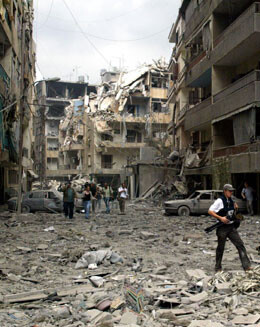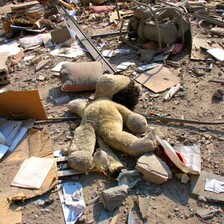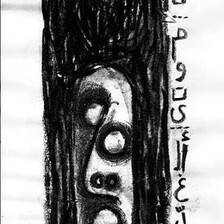Beirut 23 July 2006

The aftermath of Israeli air bombardment in Beirut, 21 July 2006. (Haitham Moussawi/IRIN)
Daily routine
I wake up on the sound of a close one (shell). The radio is on all night long. So is the TV. I listen and look at what I missed in my sleep. Last night they bombed Saida - where my aunt and her family live - they bombed Akkar in the north, they bombed the southern suburbs of Beirut (the usual), they bombed a factory in West Bekaa and they bombed - for the first time in its history - my village, Chmestarin Eastern Bekaa.
I get up, fix breakfast for my own personal refugees, and start my daily phone marathon (don’t tell them land lines are still working). I start with Saida; my aunt pretends to be strong. She tells me the bombing was far from their house. She did not synchronize with her son. When I spoke to him, he told me a mall very close to their house was hit.
I call my friend in the north: all is fine. My other friend in west Bekaa: they brought a factory down - a big one it seems - that used to build pre-fabricated houses and hangars and export them to Iraq. But that wasn’t all. Some miracle happened early this morning it seems, when the shelling spared Al Hanane Institution where tens of orphans live; the whole area was bombed like hell.
I need to mention that Hezbollah does not exist neither in the North nor in the West Bekaa - these are Sunni areas (that do not like Hezbollah anyway).
I call the family house in my village; they tell me there are over 40 people living in the house, because we have a basement. It seems that Israeli fighters flew over the village all day yesterday, took pictures and then bombed at dawn. They bombed the graveyard, where my grandfather, my uncle and my cousin are buried. My cousin tells that my ailing grandmother is not well. She’s ninety and she’s sick, and it seems that for three days now, she’s not recognizing anyone or anything. If she dies now, we won’t even be able to take part in the funeral as there are no roads, but maybe it will be less heartbreaking because every one else is dying - it’s estimated that 170 children were killed as of Saturday, 22 July.
Then I call my sister who found refuge in Alley in the mountain. All fine. The last phone call was to my sister in law, my brother’s wife who fled to Syria (her mom is Syrian). They’re staying in Bloudan, a town closer to the Lebanese border than Damascus. She told me they could hear the bombing on Baalback and the rest of the Bekaa all night long.
Kinda’s diary
Before I left to the office, Kinda, my two-year-old daughter (actually she’s 28 months old) was looking at the pictures in the newspaper. It’s a habit she took up when all this started since we’re publishing lots of pictures of the displaced children. Of course, every morning I hide the pages that contain hideous pictures and give her the rest of the newspaper: she loves to see the pictures of other children.
She saw this picture of a wounded 10-year-old girl (god she’s pretty) who’s being treated at a hospital in Beirut. She came to me and said, “Mama, baby wawa” (sick in Arabic baby language). I said, “Yes, very wawa.” And here’s what happened then - she wanted to go see her. She said, in Arabic of course, “I want to go there,” pointing at the picture. She kept insisting and wouldn’t let me go to work before I promised I’ll take her tomorrow. This is a true story - I still can’t believe it myself. I never took Kinda to a hospital before, and she doesn’t know it is customary to take presents to patients.
But I promise you this - tomorrow I’ll take her there.
Hanady the weirdo
Here are some more of my sick thoughts.
I need to tell you that ever since this started, I’ve been keeping myself busy 24/7 because I don’t want to have time to think about anything. But sometimes, I can’t help it - you know, when I’m taking a shower or trying to fall asleep. I get these weird thoughts. I try to get rid of them, but they keep coming back. Sick thoughts.
Yesterday, I thought I was completely mad because I found out that somewhere deep down inside of me, I fear the moment when all this will be over. What would happen then?
We’ll be left with the dead, the injured, the ruins, the rubbles, the refugees, the diseases, the misery of those who lost everything, all this destruction, no roads, no phones, no electricity (you know how long it takes to repair this sector?) no water, … and a corrupt, impotent government.
We’ll be left without the attention we might be getting now. Crimes should be really bad to be able to draw the world’s attention - look at how indifferent we all get to be towards other conflicts and suffering, with time. It took something as big as the massacres in Rwanda to shake us, for a while. Who remembers Africa now?
The thing is that all this destruction happened so fast (congratulations to all the scientists working on “improving” arms and their ability to be effective; they’re really doing a great job that nobody seem to appreciate). I can’t believe, for instance, that when this will end, if we’re still alive, I won’t be able to reach my own village. It’s fast and it’s reported live, so it makes it somehow unreal, as if you were watching a movie. I just can’t seem to be able to grasp the idea that this is actually happening. What do you call this? Denial?
There’s something else that explains my sick feelings and thoughts - my history. I’m 38 years old. I was seven when I witnessed my first war. I was 14 during the 1982 Israeli invasion of Lebanon. Seeing all the rubble, all these villages completely wiped out, the fires, the injured, the dead, all of it, brings me way back in time, and I stick to the idea that these images are not of what’s happening now. They’re pictures of old houses that were never rebuilt after the last war was over - that’s what I tell myself. I need to, because I fear that the moment I get to realize that this is actually happening here and now, I’d explode … literaly.
I can’t believe the kind of articles we were working on in the newspaper 12 days ago. I still have the minutes of the last meeting: two people covering a mini campaign to change the family laws that grant the kids to their dads after divorce, two other people following the lobbying efforts for granting women the right to give the Lebanese nationality to their kids if they’re married to foreigners, one person (this is the funniest) working on air pollution and the ill performance of the ministry of environmental issues, the economic department working on revenues of tourism this summer and the transportation sector (we were trying to ban trucks from circulation on weekends because they cause 10 of accidents weekly), and the education departement preparing articles about children’s summer camps, and the recent waves of immigration of the elite due to unemployment.
Related Links
Hanady Salman is an editor at As-Safir newspaper





